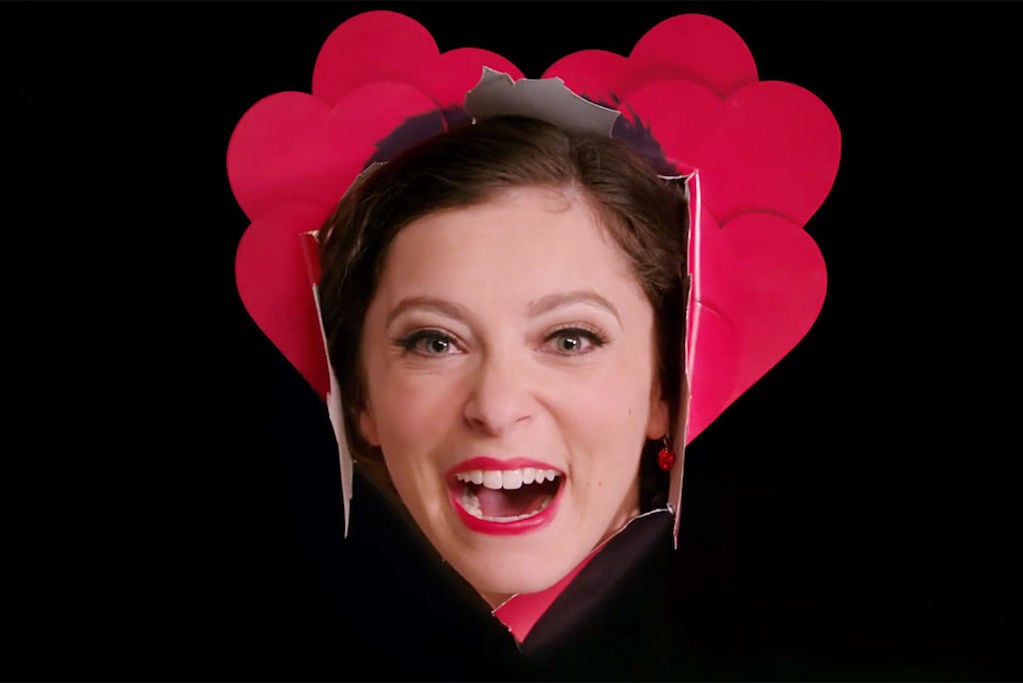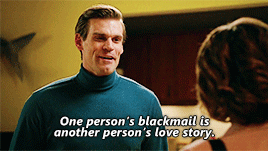It’s Okay, You’re Not The Only One Who Relates To Crazy Ex-Girlfriend’s Rebecca Bunch
"Rebecca Bunch is crazy. So am I."

Spoilers for seasons one and two of Crazy Ex-Girlfriend!
–
Rebecca Bunch is crazy. Sure, she comes with quirks, cute outfits and theatrical musical numbers, but the chipper protagonist of Crazy Ex-Girlfriend is in serious need of help.
In the show’s first season, we saw frequent instability; but the recent absolute gut-punch of a season two finale showed the love-struck lawyer in an all-out tailspin. She confronts her absentee father and her disturbing, heartbreaking backstory is finally revealed as she faces up to everything she’s been wilfully overlooking.
As someone who has, in the past, relied on men to distract from their own issues with anxiety, depression and OCD, I bristled with uncomfortable self-recognition when I first met the character. Unlike mine, Rebecca’s neurosis is never given a name, but codependency as attempted antidote is a running theme throughout the show: her relentless pursuit of her ex, her continuing faith in her deadbeat dad, her persistence in befriending her ex’s reluctant girlfriend, her on-off relationship with an equally unstable friend. In the pilot, chuffed with her decision to follow true love for happiness, she pours her antidepressants down the sink.
Since then, she’s grown into one of the most accurate representations of high-functioning depression I’ve seen on TV.
Meeting The Crazy Ex-Girlfriend
If you haven’t seen the show, here’s the premise: Rebecca, a New York City lawyer in her mid-twenties, runs into a short-term high school ex, Josh, by chance. It sparks the realisation that she’s not happy with her current life, so she decides to pack up shop and move to his hometown, West Covina. Her attempts to try and reignite their decade-old flame through a series of hijinks that are at once charming and creepy — all wrapped up in song and dance.
Show creator and star Rachel Bloom has always been open about the series’ underlying theme of mental illness. “If you’re going to have a character who packs up their life for a guy, and you want to ground it, this is not a happy person doing that — this is a profoundly disturbed person,” she told Vulture in 2015. “These are people with serious problems that put the face of their happiness onto a person.”
As outrageously comic as she is, Rebecca is a beautifully rendered character with multitudes — she loves Roxane Gay, lectures her friends about feminism and is a headstrong career woman, but is constantly at war with herself, ping-ponging between feminist confidence and a desperate yearning to be desired and accepted by others, especially men. She is not a Girl, Interrupted-style tragic, but rather painfully, completely human, with all the ups and downs that entails.
Alongside shows like Please Like Me, Girls and BoJack Horseman, the portrayal of mental health in Crazy Ex-Girlfriend is effective because of its holistic nuance — it’s one of the new crop of TV shows that uses depression not as a melodramatic plot point (see: Marissa Cooper in The OC), but simply as part of who its characters are, as complex human beings. It strikes the difficult balance between comedy and in-depth dissection of serious issues, which, as Salon’s Melanie McFarland says, “is tougher to pull off because it runs the risk of alienating people who show up to watch a comedy and get a view into depression instead”.
The show never offers romance as a feasible solution, though we often see Rebecca looking in that direction for salvation. We are positioned to deeply understand her struggle, while also being able to critically analyse her toxic behaviours towards herself and others. The writers have placed the audience in an empathetic seat — an experience that is even more harrowing when it hits close to home.
Facing The Crazy Head On
The second season of Crazy Ex-Girlfriend was all the more affecting because it challenged Rebecca to see this for herself. After almost two seasons of flitting from man to man — each relationship more disastrous than the last — Rebecca comes close to a personal revelation, much to the delight of her long-suffering therapist Dr Akopian. She’s midway through vocalising her realisation that she needs to be alone in order to fix her problems, when Josh unexpectedly bursts in and proposes. Of course, she accepts.
The epiphany is not the hard part — acting on it is. And things are further complicated by the arrival of her absent father. Of course, Rebecca’s left worse off than ever, wondering aloud, “Why do they all leave? Every man I’ve ever loved — they leave”.
The biggest kicker comes with the revelation of Robert — Rebecca’s former law professor with whom she had an affair in her college days. When he refused to leave his wife for her, Rebecca set Robert’s house on fire. This resulted in a restraining order, her expulsion from Harvard and psychiatric admission, where she “sings to herself all day”, implying that the show’s musical numbers all play out within the trappings of her lonely mind.
We see, then, the serious effects of men’s actions towards Rebecca’s psychological decline — and the show takes on a new dimension as it begins to dig deeper into the consequences of gendered emotional manipulation. Rebecca is in constant denial about this — “I have no underlying issues to address,” she sings, eyes manically wide, in the second season’s theme song — despite doing some seriously messed up things in the name of love. Judging by the closing scene of the most recent episode, she’s about to do some seriously messed up things in the name of revenge, too.
Rebecca’s fear of abandonment feeds into every aspect of her life — that’s why it’s such a powerful moment when she tells her father she never wants to see him again. It feels like the defiant beginning of a reclamation of the self he has controlled ever since he left her as a child — just like the reclamation of the term “crazy ex-girlfriend” itself, often a moniker placed upon women by the gaslighting men whose abusive actions have been the catalyst for major mental distress. At the core of Crazy Ex-Girlfriend beats a fiercely feminist heart — we are more than what others have done to us.
Despite her madcap schemes and often disquieting behaviour, the character Bloom describes as a “bubbly anti-hero” always holds the viewer’s sympathy. We root for her because we see our darkest selves reflected in her, whether she’s calling herself a “stupid bitch” in song or coming to the realisation that she is the “villain in her own story”.
One of the show’s greatest tricks is in the character of Trent, a former Harvard classmate who Rebecca pretends is her boyfriend, but who is actually in love with her. Trent acts as the perfect foil to Rebecca — his behaviour towards her is as disturbing as hers towards Josh, down to the parallel love letter songs (‘Dear Joshua Felix Chan‘ and ‘Dear Rebecca Nora Bunch‘), his devious tricks to hang out with her friends and even the hiring of a private investigator to dig up dirt from her past so he can sabotage her wedding.
We don’t feel sympathy for Trent like we do for Rebecca, but we are given a glimpse at how her actions would look if she were not the protagonist of the story.

The Heroes Of Our Own Stories
It’s disarming that such a stark, honest and nuanced analysis about self-esteem, mental health and codependency comes from a show that is basically feminist Glee. When I started watching Crazy Ex-Girlfriend, I was looking for something light-hearted, and a musical comedy seemed just the ticket. It certainly ticks that box, with lols coming thick and fast (any show that has songs dedicated to UTIs and heavy boobs is a-ok with me). It also has excellent portrayals of bisexuality, the complex joys of female friendship, diversity (more Asian men as lead love interests, please) and more.
But what it’s given me that I never expected is the courage to confront my own demons head-on, as I finally see someone a little like myself on screen.
I have sat with my heart in my throat as I watched Rebecca put the same trust in men as I have, only to be brutally hurt again, as I have. I have begun to properly understand my friends’ concerns about me using relationships as Band-Aids for the deeper issues that I have refused to address within myself, because I feel for Rebecca what they feel for me.
As someone who was first diagnosed with mental illness at seven years old, and has been in and out of doctors’ offices since, her struggle is excruciatingly familiar to me. The ups, when someone wants me. The downs, when no one does.
Rebecca Bunch is crazy. So am I. But we will emerge, victorious, as the heroes of our own stories. We have to.
–
If you’d like to talk about any issues with your mental health and options getting help, you can reach Lifeline on 13 11 14, or beyondblue on 1300 22 4636.
–
Giselle Au-Nhien Nguyen is a Vietnamese-Australian writer based in Melbourne. She tweets at @gisellenguyen.
